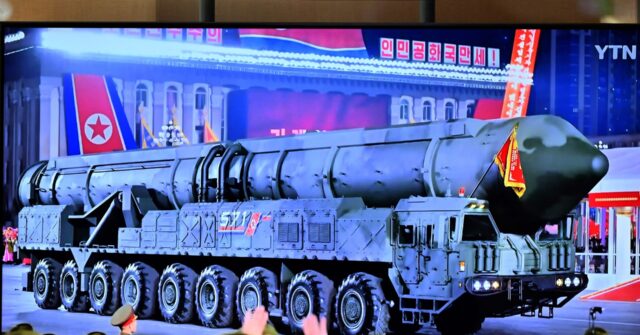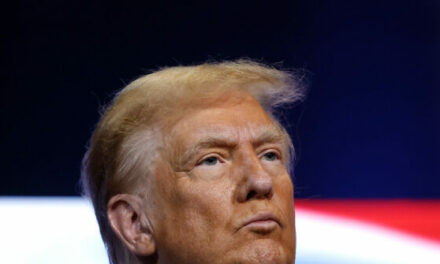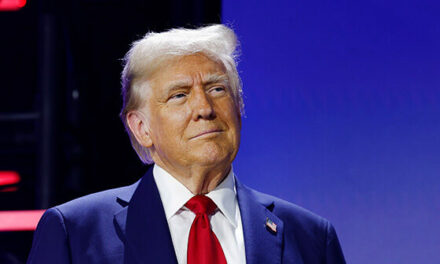We support our Publishers and Content Creators. You can view this story on their website by CLICKING HERE.

The South Korean Defense Intelligence Agency (DIA) reportedly told lawmakers on Wednesday that it had reason to believe communist North Korea has refurbished the Punggye-ri Nuclear Test Site, unused since 2017, and could potentially detonate a nuclear weapon in time for the U.S. presidential election.
Separately, a Japanese government spokesman said on Wednesday that Tokyo is considering the possibility that the communist Kim regime conducts a nuclear test in the near future, citing “relevant data.”
North Korea has illegally tested its nuclear weapons seven times in its history, the majority of them during the tenure of former American President Barack Obama. The last test occurred in 2017, fueling rumors that the bombs had damaged Punggye-ri beyond repair. In 2018, North Korea staged the “dismantling” of the site with a small explosion outside of its entrance, charging journalists $10,000 to attend the event. Pyongyang also limited its belligerent rhetoric at the time in response to the successful policies of former President Donald Trump.
Dictator Kim Jong-un has increased his talk of violence since current President Joe Biden took power. In January 2023, Kim ordered an “exponential increase” in the number of nuclear weapons his officials should manufacture to prepare to potential active war with South Korea and America. He repeated that call in September and reportedly tested the readiness of nuclear-capable missiles last week.
According to South Korean lawmakers who attended a closed-door DIA briefing, Seoul believes that Kim successfully completed reparations of the Punggye-ri site.
“The officials suggested the North could launch an ICBM to verify its atmospheric reentry technology, at a timing targeting the US presidential election in November,” the Japanese news network NHK reported. “The officials also said preparations inside the Punggye-ri nuclear test site in the northeast of the country are almost complete.”
NHK added that officials “have not ruled out North Korea going ahead with its seventh nuclear test around the time of the US presidential election.”
The South Korean news agency Yonhap quoted lawmaker Reps. Lee Seong-kweun and Park Sun-won, who shared that the DIA said “preparations are nearly complete for an ICBM-class long-range missile, including a space launch vehicle.” They also shared the possibility of a nuclear test or intercontinental ballistic missile (ICBM) test timed to coincide with the American election.
In Japan, government spokesman Yoshimasa Hayashi told reporters that the government there also has reason to believe that North Korea “may undertake further provocative actions, such as launching various missiles, a satellite, or conducting a nuclear test.” The Japanese government offered less information than what was reported out of Seoul; the spokesman said the government was analyzing “relevant data” to lead to that conclusion.
During his public appearance last week to inspect nuclear weapons facilities, Kim suggested that North Korea needs to have its nuclear weapons ready to fire as a result of alleged threats from the United States.
“As I have stressed on several occasions recently, the U.S. strategic nuclear means pose an ever-increasing threat to the security environment of the Democratic People’s Republic of Korea,” North Korean state media quoted Kim as saying, “and the prospective threats urgently demand that the DPRK [North Korea] bolster up its war deterrent definitely and take a thoroughgoing and strict counteraction posture of its nuclear forces, he said.”
Kim’s visit reportedly involved ensuring the “readiness for action of the strategic deterrent [nuclear weapons] directly related with the security of the country, including the functions and capabilities of the elements of launch-related facilities.”
The potential of a North Korean nuclear test also surfaces as reports indicate that Pyongyang is deploying thousands of troops to Russia to aid in the ongoing invasion of Ukraine. Kim signed a mutual defense agreement with Russian strongman Vladimir Putin in June whose terms remain unknown but many observers feared could require North Korea to aid the Russian war effort. South Korea’s National Intelligence Service (NIS) suggested this week that North Korea has already deployed at least 3,000 soldiers to Ukraine. South Korean President Yoon Suk-yeol spoke to Ukrainian President Volodymyr Zelensky on Tuesday, offering intelligence assistance but not committing to direct military interference in the war.
“We must thoroughly assess all possibilities and prepare countermeasures. I urge everyone to engage in risk management with a heightened sense of vigilance,” Yoon said during a cabinet meeting on Tuesday.
Yoon, a conservative, has suggested that Seoul could potentially develop its own nuclear weapons program to protect itself from a North Korean attack.
“The Republic of Korea could deploy tactical nuclear weapons or possess its own nukes,” Yoon said in January 2023, shortly after Kim Jong-un vowed to “exponentially increase” the number of nuclear warheads at his disposal. The comment prompted panic in Washington, where Biden sent a U.S. nuclear submarine to South Korea’s port city of Busan to assure Yoon that he was committed to protecting Seoul.
Multiple polls in the past decade indicate that the idea of developing an independent nuclear arsenal is popular among South Koreans.
“When asked to choose between a domestic nuclear weapons program and the stationing of U.S. nuclear weapons in South Korea, similar to that of the past, the public overwhelmingly preferred an independent arsenal,” the Washington Post detailed in 2022, “underscoring the desire among South Koreans for greater autonomy over how and when nuclear weapons would be deployed on their behalf.”

 Conservative
Conservative  Search
Search Trending
Trending Current News
Current News 







